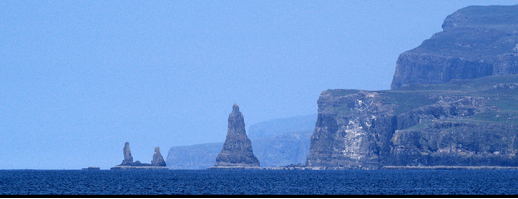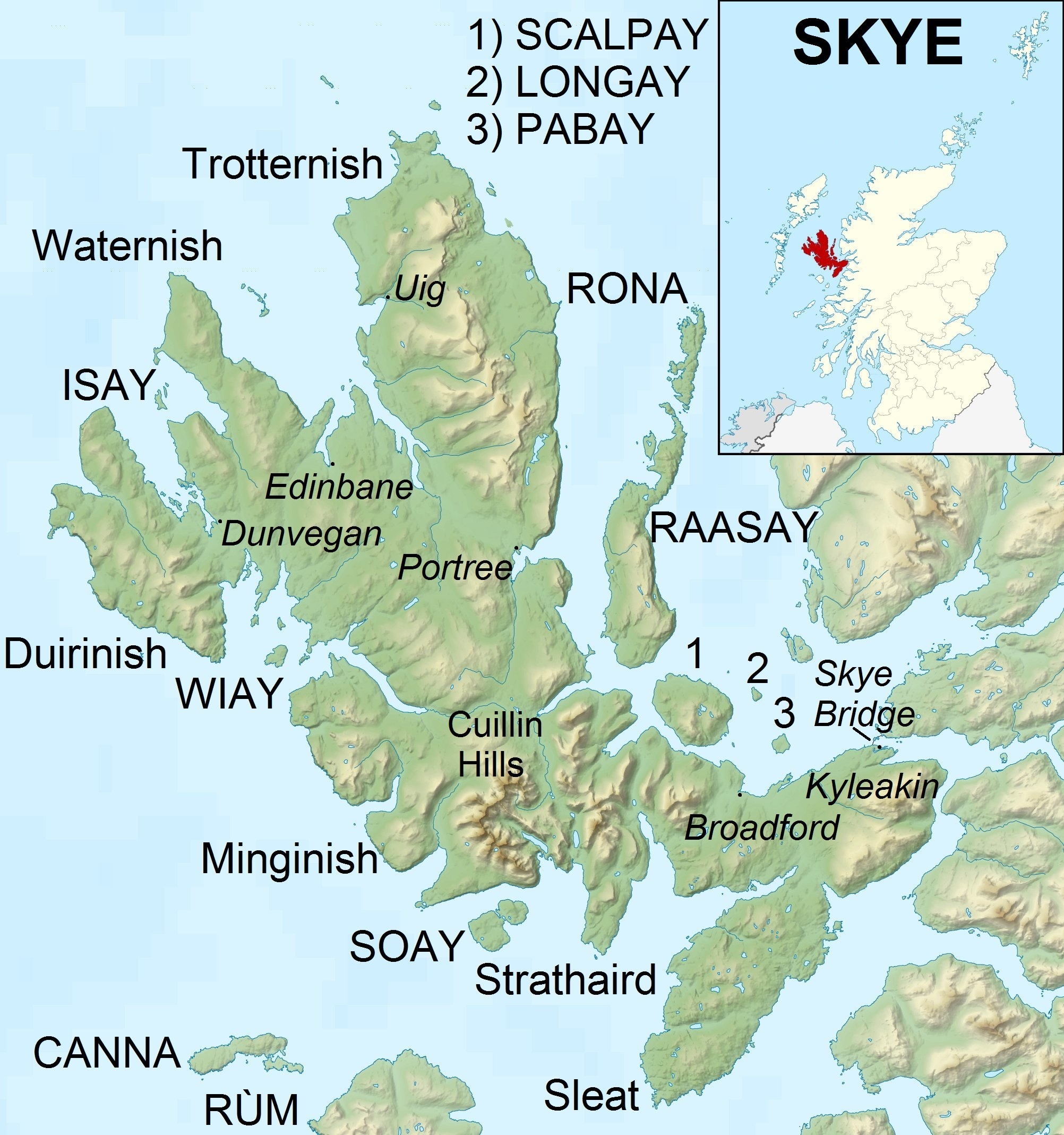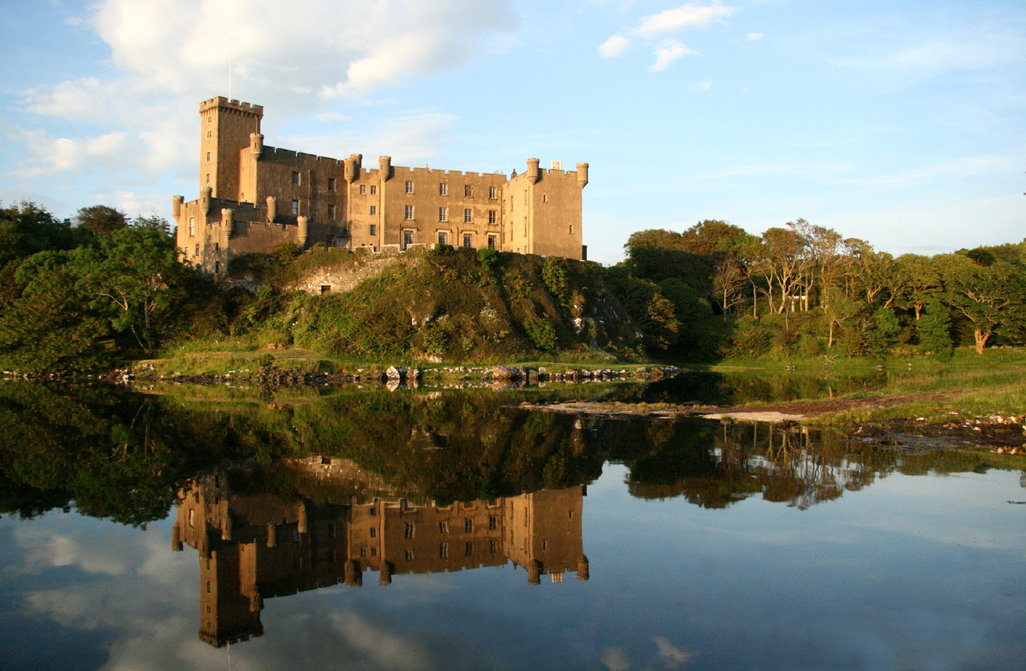|
Frances Tolmie
Frances Tolmie (13 October 1840 – 31 December 1926) was a Scottish folklorist. She was born and died on the Isle of Skye. She collected Scottish Gaelic, Gaelic songs which were published in 1911. Life Tolmie was born on a farm on Duirinish, Skye, Duirinish, at Uiginish House, on the Isle of Skye in Scotland in 1840. Her mother was Margaret MacAskill and was born on the Isle of Eigg. Her father was John Tolmie whose family had been associated with the Clan MacLeod, MacLeod clan at the nearby town of Dunvegan. Her father died when Frances was four years old and the family was then looked after by her uncle Hugh Macaskill of Talisker and his wife, where she saw a large circle of literary and cultivated friends from across the country. By 1854, she and her family moved to Strontian where her brother was to be the minister. Over the next two years she extended her education to music and she seems to have taught herself the language of Gaelic. In 1873 she was, for two terms, one of t ... [...More Info...] [...Related Items...] OR: [Wikipedia] [Google] [Baidu] |
Duirinish, Skye
Duirinish ( gd, Diùirinis) is a peninsula and Civil parishes in Scotland, civil parish on the island of Skye in Scotland. It is situated in the north west between Loch Dunvegan and Loch Bracadale. Geography Skye's shape defies description and W. H. Murray wrote that "Skye is long, but what might be its breadth is beyond the ingenuity of man to state". Malcolm Slesser suggested that its shape "sticks out of the west coast of northern Scotland like a lobster's claw ready to snap at the fish bone of Harris and Lewis", which would make Duirinish one of the claws. The main peaks are Healabhal Mhòr and Healabhal Bheag, which reach and respectively, and are better known as MacLeod's Tables. They lie in the centre of the peninsula and their distinctive shapes are visible throughout much of north west Skye. Dunvegan Head marks the north end of the peninsula and Idrigill Point the south. The west coast is now uninhabited and offshore there are only a few small islets: An Dubh Sgeir ... [...More Info...] [...Related Items...] OR: [Wikipedia] [Google] [Baidu] |
Dunvegan
Dunvegan ( gd, Dùn Bheagain) is a village on the Isle of Skye in Scotland. It is famous for Dunvegan Castle, seat of the chief of Clan MacLeod. Dunvegan is within the parish of Duirinish, and Duirinish Parish Church is at Dunvegan. In 2011 it had a population of 386. Name In ''The Norse Influence on Gaelic Scotland'' (1910), George Henderson suggests that the name ''Dùn Bheagain'' derives from Old Gaelic ''Dùn Bheccáin'' ( hefort of Beccán), Beccán being a Gaelic personal name. ''Dùn Bheagain'' would not mean 'little fort' as this would be ''Dùn Beag'' in Gaelic. Geography Dunvegan sits on the shores of the large Loch Dunvegan, and the Old School Restaurant in the village is noted for its fish, caught freshly from the loch itself. Dunvegan is situated at the junction of the A850, and the A863. The B884 road also has a junction with the A863, at the eastern end of Dunvegan. Demography Dunvegan's permanent population is declining. However, numbers staying in the area ... [...More Info...] [...Related Items...] OR: [Wikipedia] [Google] [Baidu] |
Newnham College
Newnham College is a women's constituent college of the University of Cambridge. The college was founded in 1871 by a group organising Lectures for Ladies, members of which included philosopher Henry Sidgwick and suffragist campaigner Millicent Garrett Fawcett. It was the second women's college to be founded at Cambridge, following Girton College. The College is celebrating its 150th anniversary throughout 2021 and 2022. History The history of Newnham begins with the formation of the Association for Promoting the Higher Education of Women in Cambridge in 1869. The progress of women at Cambridge University owes much to the pioneering work undertaken by the philosopher Henry Sidgwick, fellow of Trinity. Lectures for Ladies had been started in Cambridge in 1869,Stefan Collini, ‘Sidgwick, Henry (1838–1900)’, Oxford Dictionary of National Biography, Oxford University Press, 2004; online edn, May 200accessed 4 Jan 2017/ref> and such was the demand from those who could not travel ... [...More Info...] [...Related Items...] OR: [Wikipedia] [Google] [Baidu] |
Isle Of Skye
The Isle of Skye, or simply Skye (; gd, An t-Eilean Sgitheanach or ; sco, Isle o Skye), is the largest and northernmost of the major islands in the Inner Hebrides of Scotland. The island's peninsulas radiate from a mountainous hub dominated by the Cuillin, the rocky slopes of which provide some of the most dramatic mountain scenery in the country. Slesser (1981) p. 19. Although has been suggested to describe a winged shape, no definitive agreement exists as to the name's origins. The island has been occupied since the Mesolithic period, and over its history has been occupied at various times by Celtic tribes including the Picts and the Gaels, Scandinavian Vikings, and most notably the powerful integrated Norse-Gaels clans of MacLeod and MacDonald. The island was considered to be under Norwegian suzerainty until the 1266 Treaty of Perth, which transferred control over to Scotland. The 18th-century Jacobite risings led to the breaking-up of the clan system and later cleara ... [...More Info...] [...Related Items...] OR: [Wikipedia] [Google] [Baidu] |
Scottish Gaelic
Scottish Gaelic ( gd, Gàidhlig ), also known as Scots Gaelic and Gaelic, is a Goidelic language (in the Celtic branch of the Indo-European language family) native to the Gaels of Scotland. As a Goidelic language, Scottish Gaelic, as well as both Irish and Manx, developed out of Old Irish. It became a distinct spoken language sometime in the 13th century in the Middle Irish period, although a common literary language was shared by the Gaels of both Ireland and Scotland until well into the 17th century. Most of modern Scotland was once Gaelic-speaking, as evidenced especially by Gaelic-language place names. In the 2011 census of Scotland, 57,375 people (1.1% of the Scottish population aged over 3 years old) reported being able to speak Gaelic, 1,275 fewer than in 2001. The highest percentages of Gaelic speakers were in the Outer Hebrides. Nevertheless, there is a language revival, and the number of speakers of the language under age 20 did not decrease between the 2001 and ... [...More Info...] [...Related Items...] OR: [Wikipedia] [Google] [Baidu] |
Isle Of Eigg
Eigg (; gd, Eige; sco, Eigg) is one of the Small Isles in the Scottish Inner Hebrides. It lies to the south of the Isle of Skye and to the north of the Ardnamurchan peninsula. Eigg is long from north to south, and east to west. With an area of , it is the second-largest of the Small Isles after Rùm. Eigg generates virtually all of its electricity using renewable energy. Eigg has been owned by the Isle of Eigg Heritage Trust since 1997, as a community ownership; another stakeholder, the Scottish Wildlife Trust, manages the island as a nature reserve. In April 2019, National Geographic discussed the island in an online article, estimating the population at 107 and the average number of annual visitors at 10,000. Geology The larger part of the island is formed from olivine-phyric basalt flows erupted during the Palaeocene epoch. Together with flows of hawaiite and mugearite, these form the Eigg Lava Formation. The Sgùrr is formed from porphyritic rhyolitic pitchstone erupt ... [...More Info...] [...Related Items...] OR: [Wikipedia] [Google] [Baidu] |
Clan MacLeod
Clan MacLeod (; gd, Clann Mac Leòid ) is a Highland Scottish clan associated with the Isle of Skye. There are two main branches of the clan: the MacLeods of Harris and Dunvegan, whose chief is MacLeod of MacLeod, are known in Gaelic as ' ("seed of Tormod"); the Clan MacLeod of Lewis and Raasay, whose chief is MacLeod of The Lewes ( gd, Mac Ghille Chaluim), are known in Gaelic as ' ("seed of Torcall"). Both branches claim descent from Leòd, who lived in the 13th century. Today, Clan MacLeod of The Lewes, Clan MacLeod of Raasay, and Clan MacLeod are represented by "Associated Clan MacLeod Societies", and the chiefs of the three clans. The association is made up of ten national societies across the world including: Australia, Canada, England, France, Germany, New Zealand, Scotland, South Africa, Switzerland, and the United States. History Origins The surname MacLeod means 'son of Leod'. The name Leod is an Anglicization of the Scottish Gaelic name Leòd, which is thought to ... [...More Info...] [...Related Items...] OR: [Wikipedia] [Google] [Baidu] |
Strontian
Strontian (; gd, Sròn an t-Sìthein) is the main village in Sunart, an area in western Lochaber, Highland, Scotland, on the A861 road. Prior to 1975 it was part of Argyllshire. It lies on the north shore of Loch Sunart, close to the head of the loch. In the hills to the north of Strontian lead was mined in the 18th century and in these mines the mineral strontianite was discovered, from which the element strontium was first isolated. The village name in Gaelic, ''Sròn an t-Sìthein'', translates as the ''nose'' .e. 'point'''of the fairy hill'', meaning a knoll or low round hill inhabited by the mythological '' sídhe''. The nearby hamlets of Anaheilt, Bellsgrove, and Upper and Lower Scotstown are now generally considered part of Strontian, with Polloch several miles away on the terminus of the road to Loch Shiel. Strontian is the location of Ardnamurchan High School, the local fire station, police station and other facilities. Geology and mining history It was observed ... [...More Info...] [...Related Items...] OR: [Wikipedia] [Google] [Baidu] |
Lucy Broadwood
Lucy Etheldred Broadwood (9 August 1858 – 22 August 1929) was an English folksong collector and researcher, and great-granddaughter of John Broadwood, founder of the piano manufacturers Broadwood and Sons. As one of the founder members of the Folk-Song Society and Editor of the Folk-Song Journal, she was one of the main influences of the British folk revival of that period. She was an accomplished singer, composer, piano accompanist, and amateur poet. She was much sought after as a song and choral singing adjudicator at music festivals throughout England, and was also one of the four main organisers of the Leith Hill Music Festival in Surrey from its commencement in 1904 until her death in 1929. Life and work Early life and family She was born at 2am on 9 August 1858, at the Pavilion, the summer residence that her father rented at Melrose in Scotland, the daughter of the piano manufacturer (1811–1893) (eldest son of James Shudi Broadwood) and his wife Juliana Maria née Birc ... [...More Info...] [...Related Items...] OR: [Wikipedia] [Google] [Baidu] |
Rose Ethel Bassin
Rose Ethel Bassin (1889 – 29 April 1974), LRAM, ARCM, was a Scottish writer, music educator, and folklorist, known for her work in British Columbia in the 1930s, and for her biography of folklorist Frances Tolmie, published posthumously in 1977. Early life and education Bassin was born in Edinburgh, the daughter of Elieser Bassin and Fanny Bassin. Her father was an immigrant from Russia; he was raised in a Jewish household, but became a Christian convert and missionary as a young man. She attended George Watson's Ladies College in Edinburgh, and earned certificates at the Royal Academy of Music in Manchester and London. In 1915, she was the first graduate of the music teacher training program at Moray House. She studied music under Marjory Kennedy-Fraser. Career Bassin taught at schools in Scotland and England, including stints in the Hebrides. From 1927 to 1934 she was a lecturer at the University of British Columbia. While she was teaching in western Canada, she wrote a ... [...More Info...] [...Related Items...] OR: [Wikipedia] [Google] [Baidu] |
Ralph Vaughan Williams
Ralph Vaughan Williams, (; 12 October 1872– 26 August 1958) was an English composer. His works include operas, ballets, chamber music, secular and religious vocal pieces and orchestral compositions including nine symphonies, written over sixty years. Strongly influenced by Tudor music and English folk-song, his output marked a decisive break in British music from its German-dominated style of the 19th century. Vaughan Williams was born to a well-to-do family with strong moral views and a progressive social life. Throughout his life he sought to be of service to his fellow citizens, and believed in making music as available as possible to everybody. He wrote many works for amateur and student performance. He was musically a late developer, not finding his true voice until his late thirties; his studies in 1907–1908 with the French composer Maurice Ravel helped him clarify the textures of his music and free it from Music of Germany, Teutonic influences. Vaughan Williams i ... [...More Info...] [...Related Items...] OR: [Wikipedia] [Google] [Baidu] |
1840 Births
__NOTOC__ Year 184 ( CLXXXIV) was a leap year starting on Wednesday (link will display the full calendar) of the Julian calendar. At the time, it was known as the Year of the Consulship of Eggius and Aelianus (or, less frequently, year 937 ''Ab urbe condita''). The denomination 184 for this year has been used since the early medieval period, when the Anno Domini calendar era became the prevalent method in Europe for naming years. Events By place China * The Yellow Turban Rebellion and Liang Province Rebellion break out in China. * The Disasters of the Partisan Prohibitions ends. * Zhang Jue leads the peasant revolt against Emperor Ling of Han of the Eastern Han Dynasty. Heading for the capital of Luoyang, his massive and undisciplined army (360,000 men), burns and destroys government offices and outposts. * June – Ling of Han places his brother-in-law, He Jin, in command of the imperial army and sends them to attack the Yellow Turban rebels. * Winter – Zha ... [...More Info...] [...Related Items...] OR: [Wikipedia] [Google] [Baidu] |







